

caribbean population PROJECTED TO BEGIN DECLINE BY 2038
caribbean youth
DISCUSS THE FUTURE OF THE REGION AT CYD24 rally round AND INVEST IN CARIBBEAN WOMEN NOW!















































































































































Volume 11 - Issue 3
About us
Caribbean Population Projected to Begin Decline from 2038 - Progress report on Montevideo Consensus
A HUMMING BIRD FEATURE: 100 Caribbean Youth to Discuss Ways to Achieve Sustainable Development and the future of the Region at Caribbean Youth Dialogues in April
Possibility of an emissions trading scheme for the Caribbean Rally Round and Invest in Caribbean Women… NOW! An opinion by Diane Quarless Director ECLAC Caribbean 4
Issued on a monthly basis, The Hummingbird offers insights into the latest projects, publications, technical assistance missions and research carried out by ECLAC Caribbean. In addition to these, sneak previews are provided of the most salient upcoming events, alongside enriching follow-ups to previously covered issues. With a view to featuring a variety of facets of Caribbean life and lifestyle, The Hummingbird also zooms in on cultural activities and landmark occurrences through an eye-opening regional round-up.
EDITORIAL TEAM
Editor and Writer: Jabari Fraser
Proof Reader: Veera Deokiesingh-Fraser Design and Layout: Liseanne Martin-Subero
Please see our contact details on the back cover of this magazine.



10 15 4 6 14
6
7 April World Health Day
21 April World Creativity and Innovation Day
22 April
International Girls in ICT Day
23 April
World Book and Copyright Day

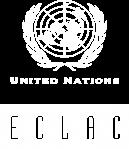
3-4 APRIL 2024
Caribbean Youth Dialogues 2024 in preparation of the ECOSOC Youth Forum
4 APRIL 2024
Fourth meeting of the Conference on Science, Innovation and ICTs of ECLAC
15 APRIL 2024
Seventh Meeting - Forum of the Countries of Latin America and the Caribbean on Sustainable Development 2024
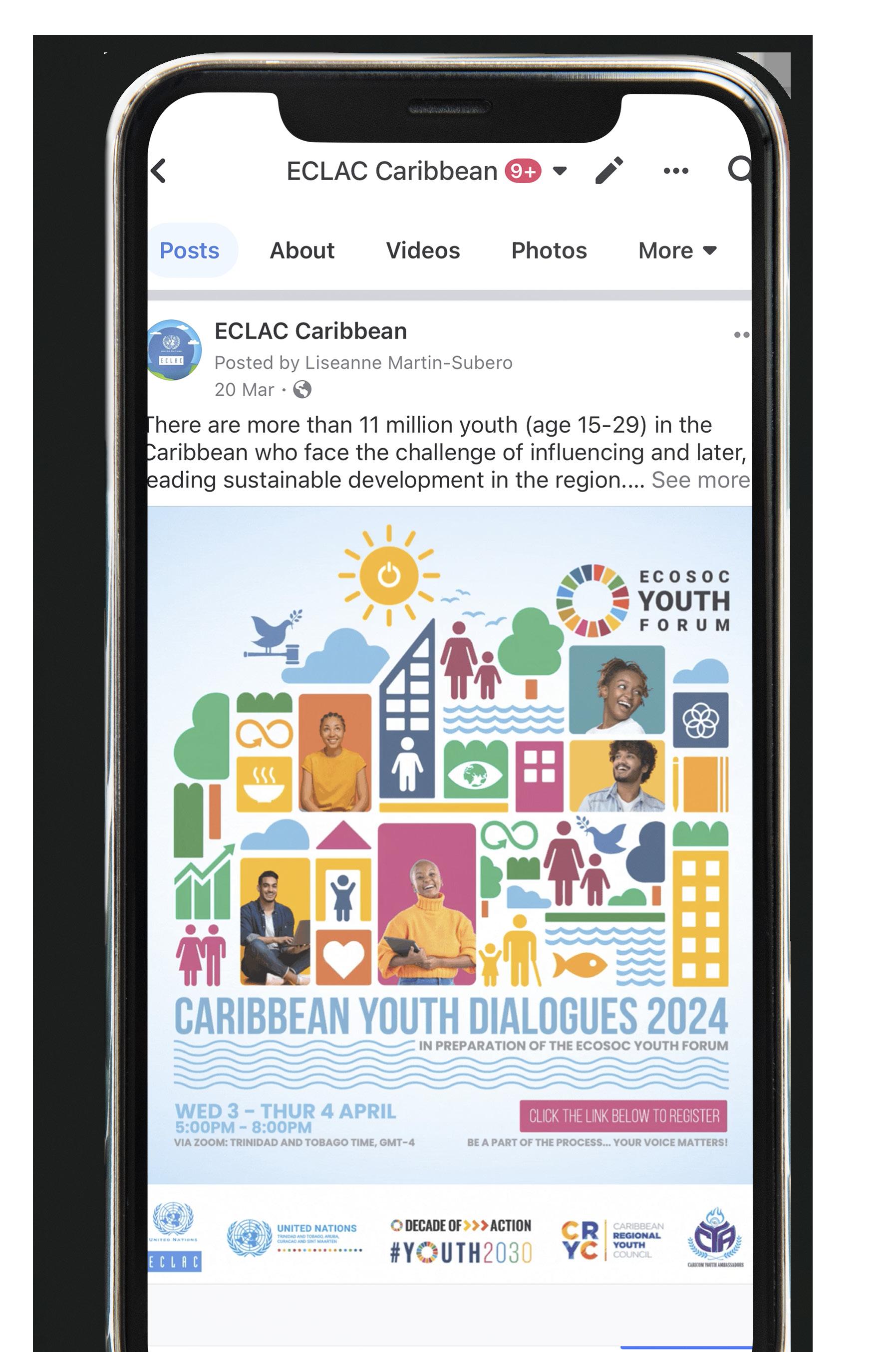
International Days Upcoming Meetings

Caribbean Population Projected TO BEGIN DECLINE
FROM 2038
PROGRESS REPORT ON MONTEVIDEO CONSENSUS
ECLAC Caribbean, in a recently published new study estimates that the Caribbean population will start to decline by 2038; indeed, some countries and territories are already recording population decline. While the current deceleration in population growth has been projected for some time, indications are that this phenomenon is advancing faster than expected, so populations will likely start to decline faster than was previously estimated.
Titled “Population and development in the Caribbean (2018–2023): accelerating implementation of the Montevideo Consensus”, the study presents an analysis of demographic trends in the Caribbean before addressing each of the thematic sections of the Montevideo Consensus, reviewing policies and programmes implemented by governments and civil society organizations, assessing the impact of those actions, and making recommendations to accelerate implementation of the Consensus. The study discusses projected population declines, population ageing and trends in international migration, the key subjects of the Montevideo Consensus. It identifies a need for greater attention to issues
4|The Hummingbird

affecting youth, including violence, unemployment, and teenage pregnancy. It describes progress in the adoption of legislation on child protection and child justice, and highlights an ongoing need to strengthen the institutions responsible for implementing these laws.
In response to population ageing, while governments have sought to strengthen policies and programmes for older persons, the pace of demographic change demands greater attention to the economic and social well-being of older persons and healthy ageing. Regarding international migration and protection of the human rights of migrants, in some Caribbean countries, migration has become the biggest driver of population change. Managing migration, therefore, will assume an increasingly important development imperative in the coming decades.
The progress report also reflects the disruption caused by COVID-19, but also reports the significant progress that has been made in many areas, in spite of the challenging circumstances. Indeed, the manner in which Caribbean societies responded and adapted to the pandemic provides some measure of hope for the recovery.
Find the study at the following link:
The Hummingbird |5
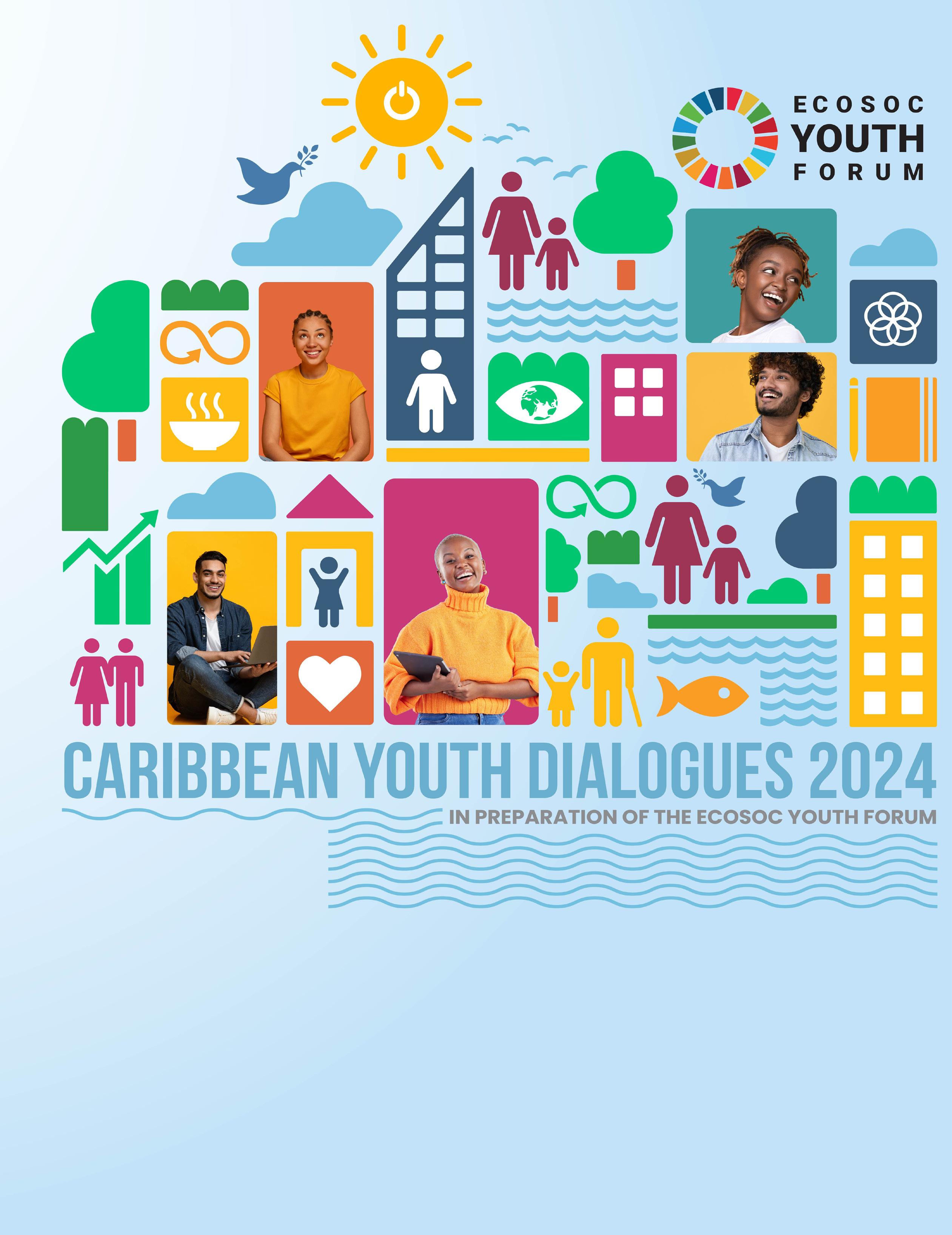
100 Caribbean Youth to Discuss Ways to Achieve
SUSTAINABLE DEVELOPMENT AND THE FUTURE OF THE REGION AT CARIBBEAN YOUTH DIALOGUES IN APRIL
6|The Hummingbird

Approximately 100 young people from the Caribbean are set to login and discuss issues affecting sustainable development and their endangered future existence as island people at the Caribbean Youth Dialogues 2024 on 3-4 April. The youth of the Caribbean will meet to brainstorm how to get Caribbean Small Island Developing States (SIDS) onto the path to sustainable development while grappling with slow development, the impacts of the COVID pandemic and other social and economic challenges.
read more The Hummingbird |7
continued from page 7
100 CARIBBEAN YOUTH TO DISCUSS WAYS TO ACHIEVE SUSTAINABLE DEVELOPMENT AND THE FUTURE OF THE REGION AT CARIBBEAN YOUTH DIALOGUES IN APRIL
Over the course of two nights, the Caribbean Youth Dialogues (CYD 2024) will provide a platform for the exchange of ideas on how to steer toward inclusive and sustainable economic and social development for the Caribbean. ECLAC Caribbean is organizing and facilitating the virtual gathering of the region’s future leaders. Director of ECLAC Caribbean, Diane Quarless, says this young generation must navigate the increasingly turbulent waters of sea level rise, climate -induced storms and water and food insecurity. “We are thrilled once again to be facilitating this gathering of the youth; to celebrate the ideas, vision and
energy of the young leaders of the Caribbean of tomorrow. This is their time. I am eager to listen to the concerns of the youth. To hear their transformative ideas. To understand their aspirations and disquiets regarding their survival and that of their children when island living as we have known it faces existential crisis”.
The discussions at CYD 2024 will feed into the ECOSOC Youth Forum, to be held from 16-18 April. The ECOSOC Youth Forum will focus on this year's UN Highlevel Political Forum (HLPF) on Sustainable Development, entitled “Reinforcing the 2030 Agenda and eradicating poverty in times
of multiple crises: the effective delivery of sustainable, resilient and innovative solutions”. The Forum, set to take place in New York, is a platform for UN Member States and young leaders to discuss challenges affecting youth well-being.
In Latin America and the Caribbean youth poverty levels are elevated. In 2002, almost 45 per cent of Latin Americans under the age of 18 lived in poverty. In 2017, a study of the Eastern Caribbean found that poverty rates among children were higher than the corresponding rates for adults in all 11 countries analysed at 33 per cent for children, compared to 21
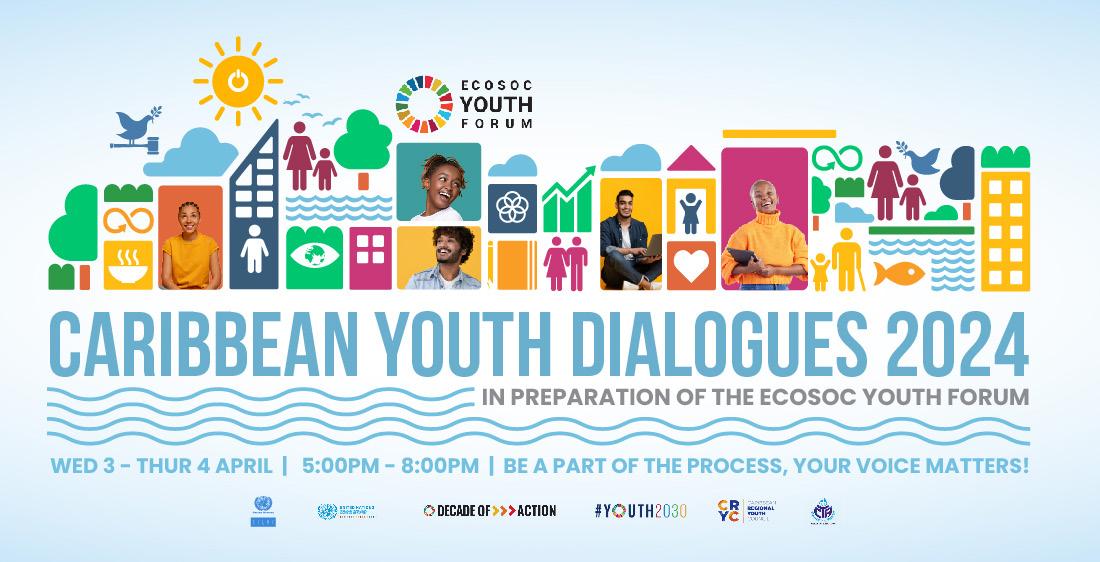
8|The Hummingbird

per cent for adults. During the COVID pandemic, the situation was exacerbated by a temporary, yet significant spike in poverty.
Te Hilla Maloney, 26-years-old, from Trinidad and Tobago, says she is looking forward to participating in CYD 2024 and focusing on the interconnected nature of the Sustainable Development Goals and all elements of human development. “I think last year was phenomenal and we really got some rich conversations and some succinct recommendations that we carried with us to ECOSOC… I see SDG 1 - addressing poverty and 2 – hunger, really laying the foundation for sustainable growth and reducing vulnerability for SDG 3 (good health and wellbeing) and climate change and the impact that brings in the region… contributing to peace and stability, which we know contributes to SDG 16.”
Maloney, a youth activist, and youth researcher says, “When we have discussions on crime and violence, the solutions are being overtaken by discussions about how we can support communities that are being plagued by the same SDG 1 and 2 issues. We can’t talk about one or the other. The overlap is so severe, and poverty and crime go hand in hand in the region. So, I look at Caribbean youth as not just being
contributors to the discussion, but being leaders, the change makers in something they have personal experience of.”
According to the UN Economic and Social Council, the Caribbean is home to more than 11 million youth between the ages of 15 and 29. They have a central role to play in achieving sustainable development in the region.
Law student and youth Activist Shamar Wedderburn, 25, from Jamaica also acknowledges how inter-connected the SDGs are and hopes that the discussions at CYD 2024 can influence the highest decision makers.
“So far, we’ve fought for young people to be at the table, but now as we edge closer towards 2030, we want young persons to be much more involved in implementation to achieve these goals akin to what SDG 17 says. That is why I, on behalf of the Caribbean Regional Youth Council, am so appreciative of moments like these Caribbean Dialogues in the lead up to the economic youth forum. They allow us to not just speak the issues, but to tally all of this in contribution to the side events in the Caribbean sessions that we will take to present at the ECOSOC Youth Forum, where young people will get to present our ideas, from grass roots community, a youth

club, a church organisation, your idea matters. And hopefully we can even get this presented at the summit for the future.”
Director Quarless says, “The Caribbean Youth Dialogues provide a platform for gathering our troops, revving their engines, and consolidating their voices in preparation for the ECOSOC Youth Forum, to be held 16-18 April at UNHQ in New York, and then for the Summit of the Future in September. It is in these forums that the youth of the Caribbean will make their voices heard in defence and support of the future of Small Island Developing States.” ECLAC has partnered with the UN Resident Coordinator’s Office for Trinidad and Tobago, Aruba, Curacao and Sint Maarten, the Caribbean Regional Youth Council and CARICOM Youth Ambassadors to organize CYD 2024.
Register and login to hear the youth speak!
#CYD24 #EYFCaribbean
#youth2030 #ECLACCaribbean
#ECLAC #CEPAL #Caricom #youth #CRYC #sustainabledevelopment
The Hummingbird |9
ANTIGUA’S SAILING WEEK
RETURNS
It’s back again: the 55th annual edition of Antigua’s Sailing Week, which runs this year from 27 April to 03 May 2024.
More than 80 boats from around the world are expected to converge on Antigua’s English and Falmouth Harbours for the event, which includes the competition for the Lord Nelson’s Trophy.
This year’s event will also include the Antigua Sailing Week Dragon Cup, with seven Petticrow Dragons racing in Falmouth Harbour, including Olympic gold medalist Paul Hoj-Jensen on the starting line.
It’s not just sailboats, though: the Antigua Wingfoil Championships are also on the agenda for the second year, with two days of racing. Even if you’re not racing, it’s an
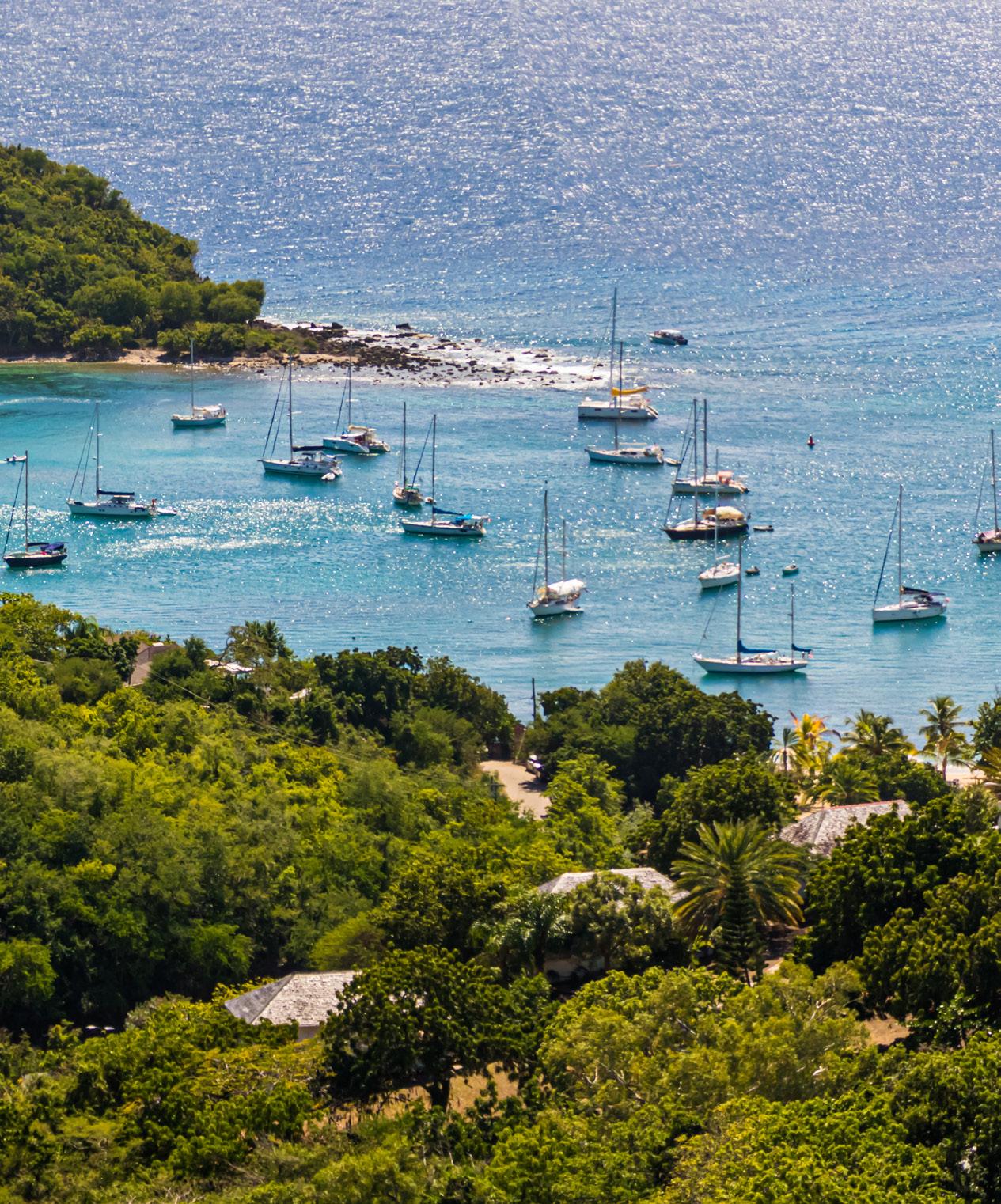
action-packed week of festivities, whether you’re enjoying the numerous onshore events or taking part in the festival’s “Chase the Rase” program, which includes finding the best vantage points on the island.
The event is one of the longest-running regattas in the Caribbean, with five days of racing and a vibrant social scene, including parties, concerts and dinners every night of the schedule.
10|The Hummingbird


The Hummingbird |11
Between 2000 and 2019 the Caribbean Community (CARICOM) produced between 0.11 and 0.16 per cent of global emissions. However, despite these relatively insignificant levels, countries in the subregion find themselves highly exposed to the impact of climate change, which includes the full range of destructive events, from hurricanes, floods and droughts, to rising temperatures, rising sea-levels and coral bleaching.
While CARICOM Member States have submitted their Nationally Determined Contributions (NDCs) to the UN Framework Convention for Climate Change (UNFCCC), they have not been very successful in mobilizing grant and concessionary support for their adaptation and mitigation needs.
Accordingly, one market-based modality, which might be useful as a tool for generating the necessary resources for implementing Caribbean NDCs is the development of a regional emissions trading scheme (ETS). At present no such market-based mechanism exists in the subregion.
Possibility of an emissions trading scheme
FOR THE CARIBBEAN

12|The Hummingbird

This opportunity is explored in a new study from ECLAC Caribbean, titled “Exploring the notion of a Caribbean emissions trading scheme: Financing the greening of Caribbean economies.”
The work considers the structure and function of ETS schemes which can be useful for leveraging implementation of Caribbean NDCs. However, for such an ETS to be a success, its framework must be structured carefully.
Key factors which must be considered in its design are the size of the emissions cap for the countries, the sectors that will be involved, the Greenhouse gases (GHGs) to be covered, a monitoring, reporting and verification framework for the GHG emissions, the emissions allowances allocation system, and an emissions allocations reserve.
The possibility that NDCs may become increasingly ambitious is also a consideration addressed in the design of a regional scheme. The revenue that is generated from the auctions can be retained by the ETS regulator to assist in offsetting its operational costs. Surplus revenue can be used to finance other climate change adaptation and mitigation projects. However, the distribution of the surplus revenue that accrues from such auctions will need
to be carefully calibrated given the heterogeneity in size, industrial development and levels of emissions across Caribbean countries.
The study encourages CARICOM Members to seriously consider developing a Caribbean regional emissions trading scheme (ETS).
It is expected that some businesses may be reluctant to participate in a mandatory ETS, which covers sectors outlined in each member state’s NDCs, since CARICOM Member States GHG emissions are exceptionally low.
However, if CARICOM Members States are committed to pursuing action to reduce their GHG emissions as expressed in their NDCs, then the regional ETS may be a feasible mechanism to stimulate GHG emission reduction action. The governments of the subregion would, however, need to reach common agreement on the feasibility and desirability of a regional ETS.
Further reading of this study can be done at the following link:
The Hummingbird |13
Rally Round and Invest
IN CARIBBEAN WOMEN… NOW!
AN OPINION
BY DIANE QUARLESS DIRECTOR ECLAC CARIBBEAN
As 2030 looms, women in the Caribbean, as all women around the world, are sadly still far from experiencing the full endowment of gender equality by the year 2030, the globally agreed deadline for achievement of the Sustainable Development Goals. Some 46 per cent of women in a cross-section of the Caribbean still face intimate partner violence; women in the region still struggle with an imbalanced unpaid work burden, especially when it comes to childcare; and globally, at the current rate, it will take 286 years to close gaps in legal protection and remove discriminatory laws against women. It is in that context that the theme for this year’s commemoration is extremely
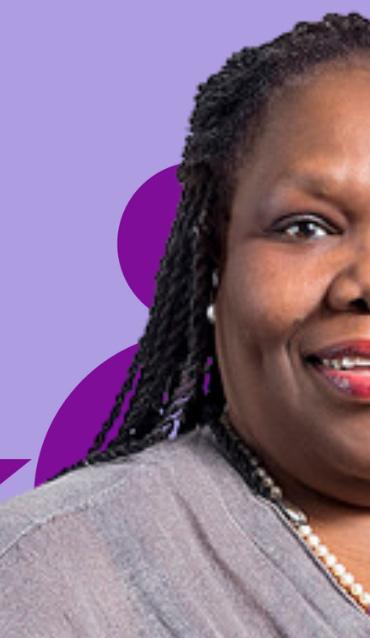
important. Invest in Women, Accelerate Progress… now!
To give a concrete idea of how much more deliberate effort and investment is required to achieve gender equality, there is an alarming US $360 billion deficit in gender equality measures that must be addressed. The COVID pandemic placed even greater hurdles for women to clear. ECLAC’s 2023 study on the gendered impact of COVID-19 on paid and unpaid work in the Caribbean showed that women, especially those in the service sector were more affected by job loss. The hospitality, tourism and food services (the lifeblood of our region) were where women felt it most.
At ECLAC Caribbean, we seek to support the region in its effort to achieve gender equality and to provide the statistics and analysis that highlight where we’re falling short. The study also revealed that there are expectations that women should do their part in the workforce while still carrying the burden of unpaid work in the home. Furthermore, women continue to earn less than men for equal work and are more likely to face unsuitable working conditions.
A 2014 ECLAC study advocated that “women’s economic empowerment should become a national priority for all Caribbean governments… There is need for States to comply with their
14|The Hummingbird

obligations to end discrimination based on sex, by addressing the disproportionate workload that women undertake in carrying out the duties of unpaid care work in the household, by introducing policies and programmes to measure time use.”
Fast forward to another ECLAC study in 2022 study on gender disparities in education and employment showed that women and girls will only be empowered when they secure equal access to such critical enablers as education, employment, productive resources and political office.
Our 2024 study on the economic impact of traffic congestion in
Trinidad and Tobago saw women respondents outnumbering men 55-39 per cent (the remaining 6 per cent preferred not to state their gender). From those figures, it can be presumed that more women face the inconvenience of traffic, and face losing significant potential earnings because of traffic congestion.
The data and analysis speak eloquently for themselves! As a region, we must continue to work on and use national statistics disaggregated by gender. We encourage the leaders of our subregion to use the resources and support that ECLAC and the wider UN system offer, to strive for gender equality.
International days are moments for reflection, analysis, education and mobilization. On this day, we reflect on women’s challenge, embrace their resilience, and celebrate their ingenuity, determination and achievement. We stand on the broad, fearless shoulders of the pioneering women who have blazed the trail before us. Women of the Caribbean and the world… big up yuhself!
See ECLAC Caribbean staff talking about women’s issues:
The Hummingbird |15
IN THE BVI NEW MUSIC FESTIVAL

The British Virgin Islands (BVI) is debuting a brand-new music festival in May, slated to take place from 24 to 26 May 2024. Titled the new Virgin Islands Music Festival, this year’s event will cover multiple genres, with everything from Soca to Afrobeat to Hip Hop.
Artistes that have signed on include Freddie Jackson, soca artist VOICE, reggae star Alkaline and BVI-based soca band Vibe, among others. The
launch is part of a broader eventsbased tourism strategy for the archipelago, according to Clive Davis, director of tourism for the BVI.
“Events put a positive spotlight on the destination and stimulate economic activity including accommodation rentals, vehicle rentals, restaurants, and transportation,” he said.
It has been more than a decade since the British Virgin Islands had such a large-scale music event.
16|The Hummingbird
After the Dominican Republic set the Caribbean’s all-time record with 10 million total visitors, local tourism officials have another major ambition for 2024: 11 million.
That’s the goal stated by Tourism Minister David Collado, who said that the number should be achievable if current trends hold.
Indeed, last month (February), the country welcomed 1.05 million visitors (sea and air), including 755,832 by air alone.
That’s a 14 per cent increase compared to the same month in 2023, and a 25 per cent jump compared to the same month in 2019, before the onset of the pandemic. On the cruise side of things, cruise passengers grew by 19 percent compared to last year.
Unsurprisingly, Punta Cana’s airport remains the country’s primary hub, accounting for just under 60 per cent of all visitors in February.

DOM REP AIMS FOR 11 MILLION VISITORS THIS YEAR
The Hummingbird |17
Almond Flour Chocolate Chip Banana Bread THE KITCHEN
What you will need:
• Nonstick cooking spray, for the pan
• 3 medium ripe bananas
• 2 large eggs
• 1/4 cup (55g) light or dark brown sugar, lightly packed
• 1/4 cup pure maple syrup
• 1 teaspoon vanilla extract
How to Make it:

• 2 1/2 cups (250g) super-fine almond flour
• 1 teaspoon ground cinnamon
• 1/2 teaspoon cardamom
• 1 teaspoon baking soda
• 1/2 teaspoon kosher salt
• 1/2 heaping cup (105g) dark chocolate chips
Step 1: Preheat oven to 350°F. Use nonstick cooking spray to generously grease a 1-pound (8 1/2x4 1/2-inch) loaf pan.
Step 2: In a large bowl, add the peeled bananas and use an electric mixer to beat them into a purée with no obvious lumps. If you don’t have an electric mixer, use a fork to mash the bananas into a purée. You should have about 1 1/2 cups mashed bananas.
Step 3:Add the eggs and beat with an electric mixer or fork until fully blended. Add the brown sugar, maple syrup, and vanilla, and beat again to fully blend.
Step 4: Add the almond flour, cinnamon, cardamon, baking soda, and salt right on top of the banana mixture. Use a fork to stir the dry ingredients together. Then, use a rubber spatula to mix the batter together until just combined, being sure to scrape the bottom and sides.
Step 5: Fold in chocolate chips.
Step 6: Transfer the batter into the prepared pan. Bake until the top feels firm to the touch and a knife inserted into the center comes out with moist crumbs and some melted chocolate (not coated in wet batter), about 1 hour and 10 minutes.
Step 7: Let the banana bread cool in the pan for at least 1 hour. Run a butter knife around the edges and gently tip it out.
Step 8: Store it in a lidded container or wrap it with plastic wrap. It will keep on the counter for up to 3 days or in the fridge for up to 6 days.
18|The Hummingbird

The Hummingbird |19





CLICK HERE OR SCAN THE QR CODE TO VISIT OUR WEBSITE... ECLAC Subregional Headquarters for the Caribbean, 1 Chancery Lane, P.O. Box 1113, Port of Spain, Trinidad and Tobago. MEDIA CONTACT Tel.: 1 868 224 8075 E-mail: eclac-media-pos@eclac.org CONTACT US SOCIAL MEDIA





































































































































